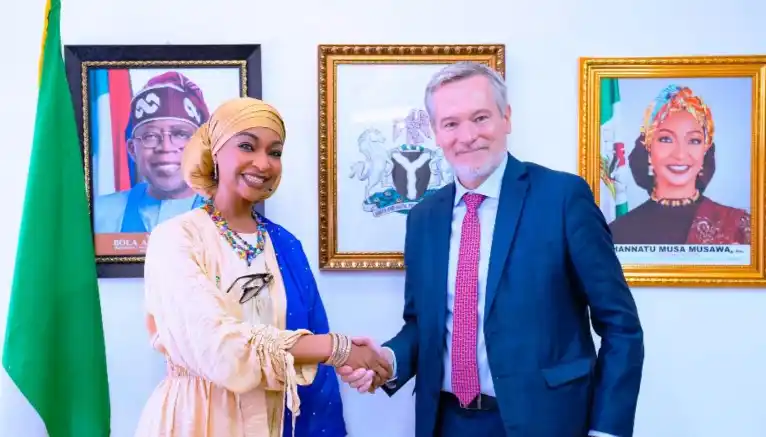Nigeria and the European Union have entered into a €20 million agreement to enhance collaborations in the cultural and creative sectors. This partnership aims to boost Nigeria’s digital creative industries, support local film festivals, and foster museum partnerships.
The announcement was made on Thursday, July 10, 2025, during a courtesy visit by the European Union delegation to the Federal Ministry of Art, Culture, Tourism and the Creative Economy in Abuja.
The delegation was led by the EU Ambassador to Nigeria and ECOWAS, Ambassador Gautier Mignot, and welcomed by the Honourable Minister of Arts, Culture, Tourism and the Creative Economy, Barrister Hannatu Musa Musawa.
“Culture is central to civilization and growth. We must harness our rich cultural heritage to drive economic growth, create jobs, and promote national unity,” said Barrister Musawa during the meeting. She further emphasized the government’s intention to use arts and culture as tools for national development and social harmony.
A key highlight of the meeting was the plan to produce a ‘Unity Song’ featuring major Nigerian artists. This project is designed to promote national unity and address security issues through the power of music, reflecting the creative economy’s potential for social change.
The €20 million initiative will also prioritize strategic international cultural exchanges and support local infrastructure for creative ventures. According to both parties, the funding is expected to make a meaningful impact on Nigeria’s cultural landscape by promoting job creation and fostering innovation in digital content creation and traditional arts.
Barrister Musawa also revealed plans for an upcoming Creative Economy Summit. The summit will bring together industry stakeholders to drive strategic collaboration and investment, while preventing duplication of efforts in the creative sector. It is expected to support innovation, digital transformation, and economic growth in Nigeria’s creative economy.
The Minister stressed the importance of data-driven policy making, noting that “data mapping will be crucial in informing cultural and creative economy interventions.” She explained that targeted, evidence-based strategies are necessary to ensure effective results and sustainable growth in the sector.
Both the Nigerian government and the EU expressed strong commitment to deepening ties through capacity building, digital skills development, and cultural preservation.
The partnership will align with international best practices but remain grounded in Nigeria’s unique cultural identity and economic realities.
In other news, NITDA DG has unveiled Digital Literacy Vision at Lagos CEO Forum.

